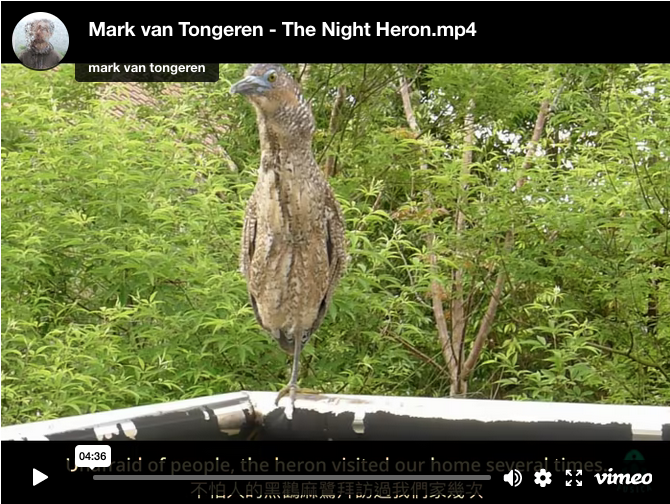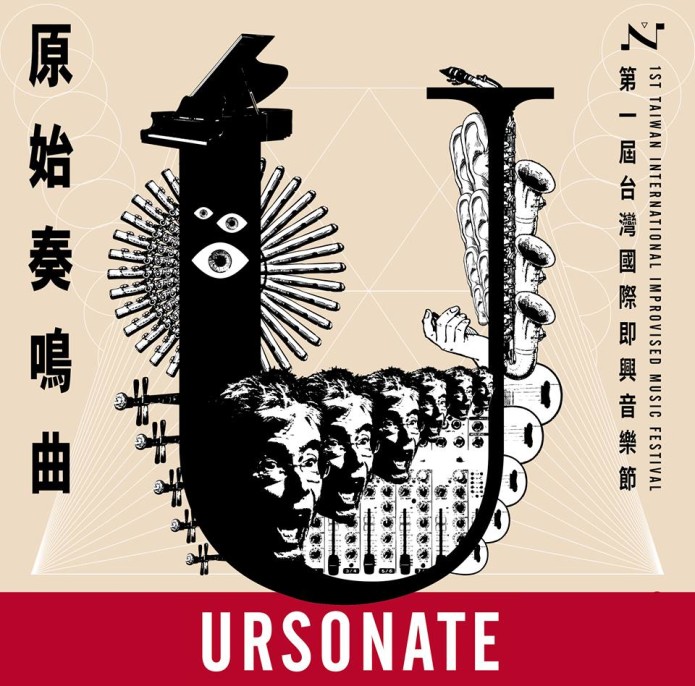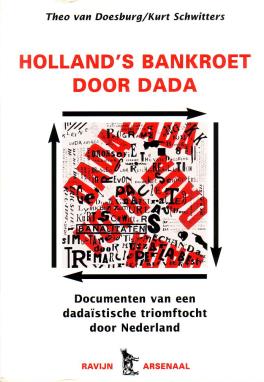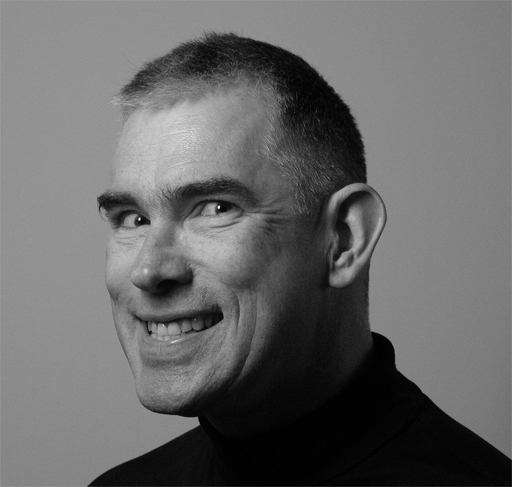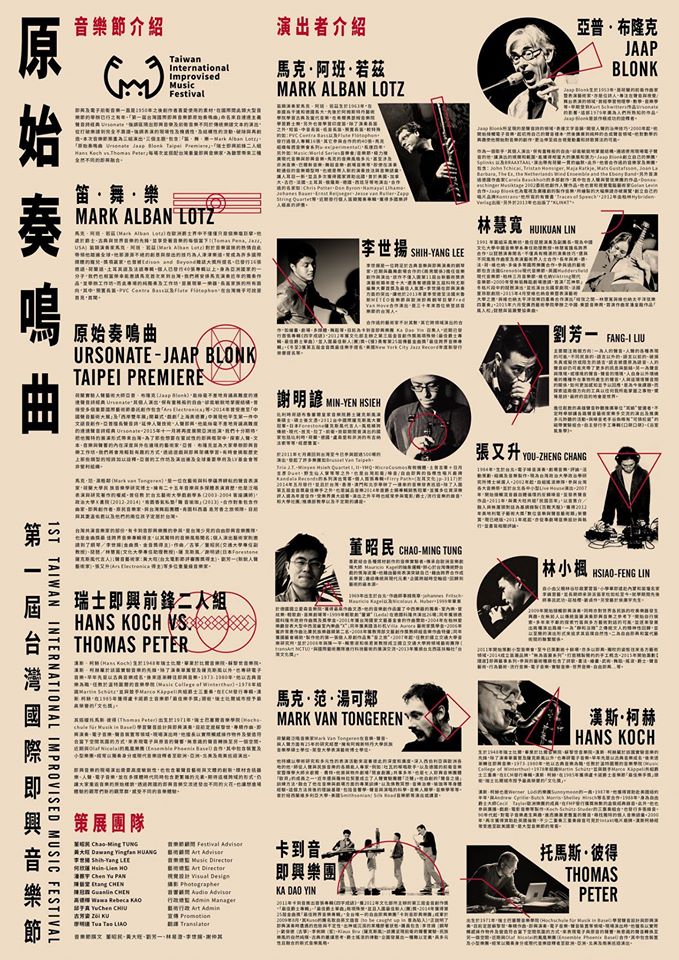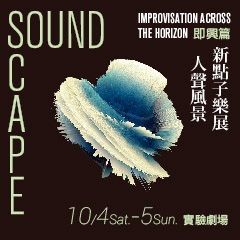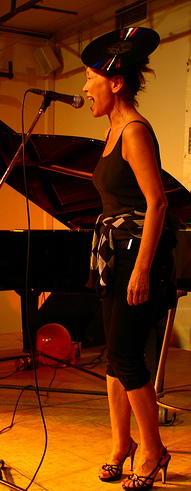I see improvisation as much more than a musical technique. While watching the performance of Joëlle Landrée, solo and with Lee Shih-Yang (November 4, Nankang Theatre, Taipei), half of my attention goes to the mimicry, body language and theatrical techniques of Landrée, who is ‘acting with’ her double bass as much as she is playing it. She talks through it, of course, but also to it. She treats it sometimes as a human being, or perhaps an animal, as she feigns anger or joy towards it. At one moment she gently kicked the lower part of her bass with her foot, as if kicking a dog bothering her.
INTERCONNECTED CIRCUITS
Joëlle Léandre responds visibly to her own music: almost as if it is not her making that music, but player and played are two; and she responds visibily to Lee Shih-Yang’s music and stage persona. In this way she sets up some sort of loops or interconnected circuits with the following elements:
- a body performing, producing sound
- a body responding to its own sound
- a body playing with and for another performer in/through sound and in/through bodily gestures, facial expressions
- a body listening and responding to that other performer in/through sound and in/through bodily gestures, facial expressions
- and also, a body playing music and acting out the music for an audience
- and responding to the audience (although rarely, in this case).
The music is the central theme of all these actions, it pervades it, surrounds it, generates it, steers it. But looking at the music alone would greatly limit our understanding of what is going on.
Joëlle Léandre’s performance was full of humor in more ways than music only can convey. Music in itself can certainly convey humor (I think of Dutch conceptual artist Wim T. Schippers playing a well-known Bach piece on piano, making all sorts of mistakes, trying to correct himself, repeating phrases, moving faster and slower, in the music-theatre piece Hoogwater voorheen Laagwater, 2016). But sometimes the musician herself becomes not just the medium of the music or sound, but something more like an actor or performer, aware of the fact that she is also playing a role onstage. She might exaggerate musical gestures in more than simply practical ways, she might use the body and facial expressions to convey messages that go far beyond what musicians express ‘as music’.
Léandre’s face showed some sort of running commentary to her own music and to the interaction with Lee Shih-Yang and at times made the audience laugh. By doing that, she puts the musician’s efforts between brackets, distances herself from it, provides some sort of criticism even as she is making music. It enhances the important idea in improvisation that the music itself, too, can be a running commentary on what the performers do.
You could say that some (in fact: many) musicians provide this commentary more discreetly, by only responding in music and not or not clearly in gesture, face, or body. Léandre on the other hand chose to enlarge her response through these means, making it less discrete, less hidden, less vague to the audience. Yet there were also moments when her playing, and her playing only, was a comment: this is one of the most common patterns in improvisation, and certainly so in jazz, where the musicians ‘comment’ on each other, ‘talk’ to each other. They build and exchange phrases, affirm and challenge each other, take the point of one musician further by moving on with it. This too was happening Saturday in Nankang theatre: rhythms, melodic patterns, noises and clusters going back and forth between Léandre and Lee, without obvious physical expression going along with it.
Intense music that requires concentrated listening, and where we can hardly be sure that what I hear is what the musicians intend, but where we still try to figure out what Lee is doing with Léandre’s ideas, and vice versa (of course, a perfectly valid alternative is not to care about this at all, but ‘simply enjoy’ the music, without figuring things out that you cannot know for sure anyway).
Music itself naturally triggers all sorts of physical, facial and other expressions, fitting to the roles of dedicated, serious musicians. We see it all the time, in video clips, classical performances, jazz: any music style has a number of ways in which the musician seeks ways to express music’s manifold qualities. Just some musicians, more than others, go way beyond the musical language itself. One can debate if this contributes to the music or distracts from it: purists might be bothered and uninterested in musicians acting out their performance too much. There are plenty of examples of exaggerated and silly theatricality in musical performance. One that comes to mind is many modern, female pipa players (a Chinese type of lute held upright in front of the player), who excessively sway their bodies and heads. I mostly prefer the old pipa practice where the music does not need all that visual display; it usually sounds better. Certain kinds of theatricality add nothing to the music but commercial value; it sometimes only serves to cover up a lack of genuine musical quality.
If the music still comes first, though, the expansion of the performative language can add many layers of meaning and expression to an already rich, interesting performance, instead of peeling off those layers. In rare cases, performers truly and convincingly embody multiple languages, fluently blending the musical performance mode with other ones, like dance, movement, facial expressions. In India, earlier this year, I had a chance to see a live performance if singer Venkatesh Kumar. He is an absolute master of of his raga improvisations and also of his body. In several long drawn-out pieces he used his arms, hands and facial expressions to express his journey through the dense network of musical connections that makes up a raga. Fascinating stuff!
So far for the non-musical gestures. I guess some of this can be gleaned also from a brand new book that I hope to read soon. It will certainly interest those who want to know more about the why’s and how’s of improvising: Marcel Cobussen’s The Field of Musical Improvisation, an e-book that is free for download since a few weeks.
Last night was the first concert with Makigami Koichi. Tonight is the closing concert of the TIIMF here in Taipei.
Saturday November 25
Zhongshan Hall, Taipei, 19:30
Closing concert of the Taiwan International Improvised Music Festival
With Porta Chiusa; and Makigami Koichi (voice, theremin, Jew’s harp, shakuhachi), Tung Chaoming (guzheng), Mark van Tongeren (voice, sruti box, Jew’s harp), and others
Sunday November 26
Reykjavik Lab /愛雷克雅維克實驗室, Taipei
13:30-17:00, workshop Improvise!
Details and tickets on Accupass, or send a message to 0910382749


